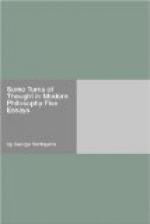Thus the appearance of things is always, in some measure, a true index to their reality. Animals are inevitably engaged in self-transcending action, and the consciousness of self-transcending action is self-transcendent knowledge. The very nature of animal life makes it possible, within animal consciousness, to discount appearance and to correct illusion—things which in a vegetative or aesthetic sensibility would not be distinguishable from pure experience itself. But when aroused to self-transcendent attention, feeling must needs rise to intelligence, so that external fact and impartial truth come within the range of consciousness, not indeed by being contained there, but by being aimed at.
V
Page 19. Conscious mind was a fact on its own account.
This conscious mind was a man’s moral being, and personal identity could not extend further than possible memory. This doctrine of Locke’s had some comic applications. The Bishop of Worcester was alarmed. If actions which a hardened sinner had forgotten were no longer his, a short memory would be a great blessing in the Day of Judgment. On the other hand, a theology more plastic than Stillingfleet’s would one day find in this same doctrine a new means of edification. For if I may disown all actions I have forgotten, may not things not done or witnessed by me in the body be now appropriated and incorporated in my consciousness, if only I conceive them vividly? The door is then open to all the noble ambiguities of idealism. As my consciousness expands, or thinks it expands, into dramatic sympathy with universal experience, that experience becomes my own. I may say I have been the agent in all past achievements. Emerson could know that he was Shakespeare and Caesar and Christ. Futurity is mine also, in every possible direction at once; and I am one with the spirit of the universe and with God.
Locke reassured the Bishop of Worcester, and was humbly confident that Divine Justice would find a way of vindicating Itself in spite of human wit. He might have added that if the sin of Adam could not only be imputed to us juridically but could actually taint our consciousness—as it certainly does if by Adam we understand our whole material heritage—so surely the sins done or the habits acquired by the body beyond the scope of consciousness may taint or clarify this consciousness now. Indeed, the idea we form of ourselves and of our respective experiences is a figment of vanity, a product of dramatic imagination, without cognitive import save as a reading of the hidden forces, physical or divine, which have formed us and actually govern us.
VI
Page 19. Mind and body interacted.




